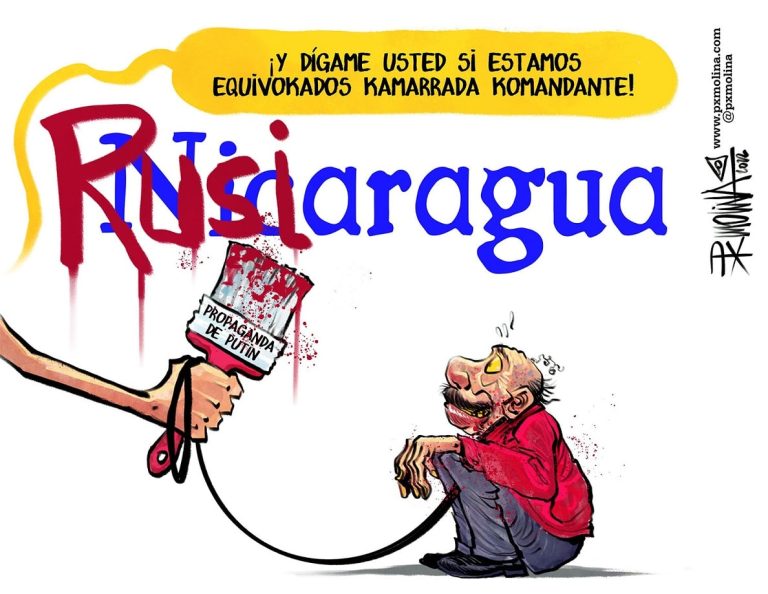30 de junio 2022

Children of Exile: The Births “Sowing Hope” in the Camp of Nicaraguan Farmers

PUBLICIDAD 1M
PUBLICIDAD 4D
PUBLICIDAD 5D
Daniel Ortega and Rosario Murillo, like Fidel Castro in the 1960s, are playing with global war, this time threatened by Putin.

The news on the authorization of more Russian troops entering Nicaragua has not gone unnoticed by the United States.
For several years, Russia has been supplying T 72 tanks, GAZ 2330 armored vehicles, Molnia guided-missile boats, Mirazh patrol boats, ZU-23-2 anti-aircraft defense systems, and has secret contracts for the delivery of Yak 130 fighter planes.
The relationship with the Kremlin goes beyond military equipment. Putin is said to have built a military training center disguised as a so-called anti-narcotics training center.
There still exists on the shores of Lake Managua the Punta Huete airstrip, built (in the 1980s) with the intention of accommodating MIG planes and which could become operational in a short time.
Additionally, the disciples of the KGB have also built a satellite tracking station that is supposedly at the service of the Russian GPS, Glonass; but which, in reality, can collect regional intelligence information and send it directly to Moscow.
Russian militarism in the region responds to the call of Daniel Ortega, who like his predecessors of the 19th century, who asked William Walker to solve internal problems, today urges the new tsar to engage in Nicaraguan and regional politics.
A stepped-up Russian presence has been rekindled with the transformations of the current world geopolitical context.
The order of the tyrannical couple to their parliamentarian lackeys to authorize the entry of troops has been complemented by visits of Russian officials of the highest political and military level, in the days before and after the brutal invasion of Ukraine.
Deputy Prime Minister Yuri Borisov, a former deputy defense minister, arrived in Nicaragua in February with proposals for military cooperation. On February 24, while Putin was rolling his tanks against Ukrainian civilians, Vyacheslav Volodin, president of the Lower Chamber (DUMA) appeared in Managua and thanked Ortega for his support in Ukraine and Crimea, as well as the recognition of South Ossetia and Abkhazia, fake Caucasian states wrested from Georgia by force.
Ortega’s new strategic alignment with Moscow, encouraged by the Kremlin’s return to wars of conquest, was reflected in statements by Russian state television anchorwoman, Olga Skabeeva, who introduced Central America in the framework of their geopolitical ambitions: “It is time for Russia to deploy something powerful closer to US cities.” Apparently trying to reedit a scenario similar to the installation of missiles with nuclear warheads in Cuba (1962).
Later, the news site Sputnik, financed by Moscow, published a report stating that in Nicaragua the military cooperation with Russia responds to national security principles, contradicting statements that the Russians are in Nicaragua to fight drug trafficking and for humanitarian purposes.
Ortega and Rosario Murillo, like Fidel Castro in the 1960s, are playing with global war, this time threatened by Putin.
Russian national security is not endangered by what happens in Nicaragua. Our countries are only a bargaining chip that Moscow will try to establish to have an area of influence, with limited sovereignty, in the countries in its close neighborhood, in exchange for not creating friction in Washington’s backyard.
In this context, Costa Rica should develop a very active diplomacy, explaining to the world that we are an unarmed democracy, respectful of human rights, social justice, and international law.
The search for alliances in America and Europe is also an imperative, as well as the preparation for the implementation of the collective security mechanism (TIAR) in view of the remote possibility that the autocratic pair (Ortega y Murillo) reclaims Guanacaste and the northern plains of our country, emboldened by Putin’s example, violator of the territorial integrity of Ukraine and other countries.
The increase in the flow of refugees, the result of poverty and repression in Nicaragua, will require resources from the international community. Trade to Central America will also demand diplomatic action. On other occasions Ortega has threatened to disrupt the transit of our exports (20% of the total).
Costa Rica must be alert and seek broader support from the international community, in view of the rupture of the balance of military forces due to the incursion of an imperialist Russia, protecting the interests of a dictatorial family clan.
This article was originally published in El Financiero and translated by Havana Times
PUBLICIDAD 3M
Diario digital costarricense especializado en economía, finanzas, tecnología y negocios.
PUBLICIDAD 3D